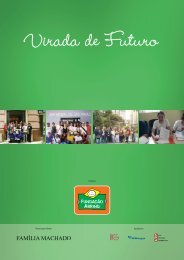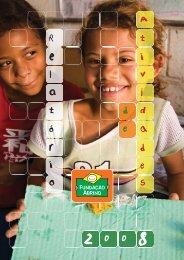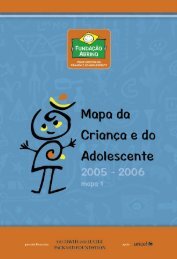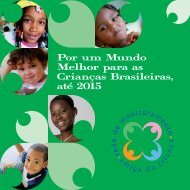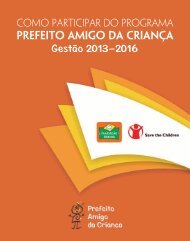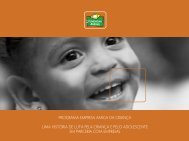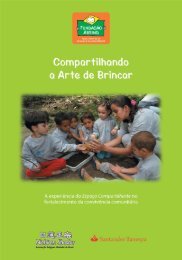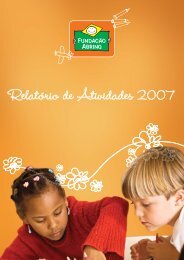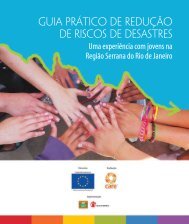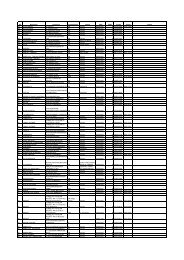Funding PartnersAll of this without letting our attention to all the other children and youngsters slip andalways in the unchanging aim of defending rights and seeking to take the successfulpractices used in our programs and projects to state schools. We dedicate special attentionto social-educational actions focused on the relationship of young people with the workuniverse, where we have started two important projects, as well as maintaining activeparticipation in the Conselho Nacional da Juventude (National Youth Council).For 2007 our expectation is to proceed firmly along this path, taking with us the trust andconstant participation of our partners, in the incessant quest to contribute to the buildingof a more just society.STIMULATION AND PRESSURE FOR THE IMPLEMENTATION OF PUBLIC ACTIONSThe Federal Constitution and the Children and Adolescents Act determine that it is the dutyof the State, the family and society to validate and practice the rights of Brazilian childrenand adolescents. However, the formal declaration of these rights has not proved to beenough for the effective practice of the same: objective conditions must be created so thatthey may be accessed and exercised.The State answers for more than 94% of all the costs and investments required for its socialpolicies. It is the correct destination of this huge volume of resources that guarantees theeffective attention to the needs of the population.Brazilian public policy in regard to social issues largely lack planning, presenting stop-gap, discontinuous,fragmented, incomplete and selective programs. These programs usually have dispersedactions that squander the generally waning efforts and resources offered by the State.Carlos Antonio TilkianPresident of the Board of DirectorsINTRODUCTIONThe results of the <strong>Abrinq</strong> Foundation in <strong>2006</strong> are presented separately in accordance withthe different lines of work defined in its planning:Stimulation and pressure for the implementation of public actions;Strengthening of governmental and non-governmental organizations for theprovision of services or the defense of rights;Stimulation for social responsibility regarding the rights of children ;Political and social articulation in the construction and defense of the rights ofchildren and adolescents;Awareness of Brazilian reality in relation the rights of children and adolescents;Sustainability.The actions, programs and projects of the Foundation are transversal in relation to itslines of work, nevertheless, their impacts are not distributed uniformly and are oftenconcentrated on specific lines.The <strong>Abrinq</strong> Foundation seeks to act in such a way that its actions, programs and projectshave an impact on the largest possible number of Brazilian children and adolescentsin order to fulfill its mission. With this in mind, the actions, programs and projects areplanned according to their potential capacity for systematization and for adoption by otherorganizations or as public policies.Reversal of this historical tendency requires the adoption of mechanisms for the rationalizationof management in public actions and social control over the use of resources. The<strong>Abrinq</strong> Foundation seeks to bear an influence on the implementation of public policies viastimulation of social monitoring and control, and the capacitating of public administratorsand civilian social organization.<strong>2006</strong> was a presidential election year in Brazil. The Projeto Presidente Amigo da Criança(Child Friendly President Project), which seeks to guarantee the commitment of theBrazilian president to policies aimed at children and adolescents, dedicated itself toanalyzing the administration of president Luis Inácio Lula da Silva (2003-<strong>2006</strong>) and begana new cycle of the project for the presidential administration from 2007 to 2010. Theproject has the support of the International Labour Organization (OIT), the Brazilian HotelOperators Forum (FOHB), the Save the Children UK and Unicef.In August of <strong>2006</strong> the “Termo de Compromisso Presidente Amigo da Criança – Gestão2007-2010” (Child Friendly President Vow of Commitment – 2007-2010 Administration)was launched. With the participation of civilian social organizations that form part of theRede de Monitoramento Amiga da Criança (Child Friendly Monitoring Network). The Vowconsiders the current stage of the fulfillment of the Goals for the Millennium and definesthe challenges for the next presidential administration, as well as making explicit thecommitments of the federal government to planning, social participation and implantationof the Orçamento Criança (Children’s Budget), a methodology aimed at providingtransparency to the investments made in the area of childhood via the public budget.The four most important candidates for the <strong>2006</strong> presidential elections, Luis Inácio Lulada Silva, Geraldo Alckmin, Cristovam Buarque and Heloísa Helena, signed the “Termode Compromisso Presidente Amigo da Criança – Gestão 2007-2010”, thereby publiclyassuming a commitment to Brazil’s children and adolescents and recognizing theimportance of dialogue with civilian society.In order to provide continuity to the 2003-<strong>2006</strong> cycle of the Presidente Amigo da CriançaProgram, the federal government delivered the “Presidente Amigo da Criança Reports”relating to 2004 and 2005, in February and June of <strong>2006</strong> respectively. The Report for 200558
Funding Partnerwas delivered personally by the <strong>Abrinq</strong> Foundation’s Special Secretary of Human Rights,Paulo Vannucchi, with the presence of representatives from the Rede de MonitoramentoAmiga da Criança and the Conselho Nacional dos Direitos da Criança e do Adolescente.<strong>2006</strong> was also significant in the 2005-2008 cycle of the Prefeito Amigo da CriançaProgram, which mobilizes and monitors municipal public administrations in the aim ofgaining their commitment and supporting them in the implantation of public policies topromote improvements in the quality of life for children and adolescents.Following an intense mobilization of the Brazilian town councils in 2005, which resultedin the compliance of 2,263 municipalities to the Prefeito Amigo da Criança Network, theprogram carried out its first assessment of the 2005-2008 administration via the Mapada Criança e do Adolescente (Children and Adolescents Map) for 2005-<strong>2006</strong> – Map I,an instrument for gathering information that also offers subsidies to the municipalitiesregarding the implementation of policies aimed at children and adolescents. 1,155 municipalitiesresponded to Map I, in other words, 20% of Brazil’s towns.The Mapa da Criança e do Adolescente for 2005-<strong>2006</strong> mobilized the municipalities participatingin the program and promoted local debate on the situations of the violation of the rightsof children and adolescents and the capacity of the public administration to deal with them.This important result translates as the implementation of Municipal Assessment Commissionsin 55% of these towns, involving the Local Councils for the Rights of Children and Adolescentsand the participation of the Public Ministry, Child Courts, representatives of the municipallegislation, of the business sector and of tutelary counsels, among other local actors in thegathering and validation of the information requested for the Map.Special mention should also be given to the inter-municipal articulation initiatives: thetown councils of Recife, in the state of Pernambuco, and of Votuporanga, in the northeasternregion of the state of São Paulo, supported and mobilized more than 40 municipalitiesin the regions to respond to the questions for Map I. Based on local initiative, inter-municipalmeetings were also held for instruction on how to fill in the documents in the states ofEspírito Santo, Tocantins and Piauí.The assessment process indicates that a number of Brazilian municipalities have come toadopt mechanisms for inter-sectorial planning, as in the case of the Orçamento Criança:731 municipalities used this methodology at some time in their budgetary planning.In order to achieve these results, and attentive to the diversity of the Brazilian municipalities,a teleconference was held and which made for an agile and efficient dialogue withthe local administrators and advisors on the rights of children and adolescents in themore than 170 points of the Sesc/Senac Television Network throughout Brazil. This actionresulted in an audience of 1,558 participants, simultaneously connected to the PrefeitoAmigo da Criança Program.The 842 municipalities that, after analysis of the Maps, received the Prefeito Amigo daCriança Seal – 1st Assessment Phase saw a return on the information sent, with recommendationsindicating which actions should be carried out in order to improve the livingconditions of children and adolescents in each location. They also received the DVD “PactoFederativo e as Políticas Sociais para a Infância e Adolescência – O Papel dos Municípios”(Federal Agreement and Social Policies for Childhood and Adolescence – the Role of Municipalities),training material regarding the Federal Agreement, which guides municipalactions and states the responsibility of the public for guaranteeing social rights.This program, which has the partnership of The David and Lucile Packard Foundation, hasa Strategic Action Committee to support the Program’s directives and actions and which isformed of nationwide organizations. The program also has the support of the DATASUS/MS– the Information Technology Department for the SUS (General Data and Technology Coordination)and of the INEP/MEC – Anísio Teixeira National Institute for Educational Studies andResearch (Educational Data Treatment and Dissemination), who provide secondary indicators.Brief background of the Presidente Amigo da Criança ProjectIn 2002, during the election campaign, the <strong>Abrinq</strong> Foundation launched the PresidenteAmigo da Criança Project, which sought the signatures of the main presidential candidateson the “Termo de Compromisso Presidente Amigo da Criança”.This vow commits the candidate to, if elected, “carrying out, in a challenging way, the significantimprovement of the numbers relating to the situation of children and adolescents in a four yearmandate, using as a reference the commitment assumed by the Brazilian Government in the UNO– United Nations Organization’s Special Session for Childhood , in May of 2002”.In order to do so, the president elect must draw up a plan of action to fulfill the goalsdefined by the UNO, to include the plan of action in the budget for the Multi-Annual Plan,to not limit access to the resources needed for carrying out the plan of action and to monitorand assess the development of the plan of action, as well as making data available andproviding accountability to a network of civilian social organizations.In the aim of monitoring the implementation of the administration commitments assumedby the president elect, to analyze the progress towards the goals in the areas of education,health and protection, to disclose the analyses and recommendations produced and tomake viable the participation of children and adolescents, the Amiga da Criança MonitoringNetwork was set up, composed of civilian social organizations, multilateral bodiesand the Rede Sou de Atitude (I’ve got Attitude Network), a youth network present in 16Brazilian states.Numbers for the Prefeito Amigo da Criança Program2,263 mayors and mayoresses make up the PPAC network, in other words, an increaseof 46.6% in relation to the previous administration (2001-2004), when theparticipation was 1,542 municipalities. There are 42,229,906 children and adolescentsliving in these municipalities.1,155 municipalities responded to the 2005-<strong>2006</strong> Children and Adolescents Map.1,074 towns implanted Municipal Commissions for evaluation and monitoring.731 municipalities adopted the Orçamento Criança methodology, in at least one of thephases of their Budgetary Planning.842 municipalities received the Prefeito Amigo da Criança Seal – 1st assessment phase.59



